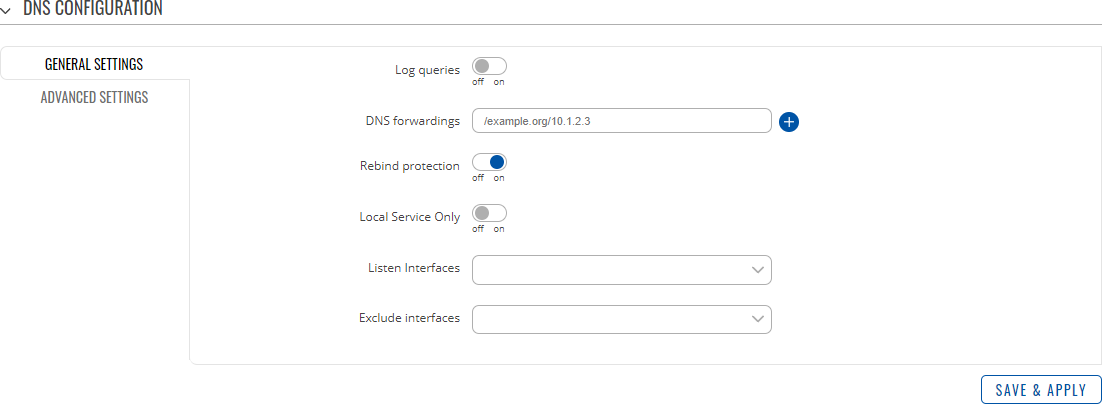Template:Networking rutos manual dns: Difference between revisions
No edit summary |
Gytispieze (talk | contribs) No edit summary |
||
| Line 25: | Line 25: | ||
<th>Value</th> | <th>Value</th> | ||
<th>Description</th> | <th>Description</th> | ||
</tr> | </tr> | ||
<tr> | <tr> | ||
| Line 55: | Line 40: | ||
<td>off | on; default: <b>on</b></td> | <td>off | on; default: <b>on</b></td> | ||
<td>Discards upstream RFC1918 responses. When enabled, the device will not resolve domain names for internal hosts.</td> | <td>Discards upstream RFC1918 responses. When enabled, the device will not resolve domain names for internal hosts.</td> | ||
</tr> | </tr> | ||
<tr> | <tr> | ||
| Line 70: | Line 45: | ||
<td>off | on; default: <b>off</b></td> | <td>off | on; default: <b>off</b></td> | ||
<td>Limit DNS service to subnets and interfaces on which this device is serving as a DNS server.</td> | <td>Limit DNS service to subnets and interfaces on which this device is serving as a DNS server.</td> | ||
</tr> | </tr> | ||
<tr> | <tr> | ||
| Line 85: | Line 55: | ||
<td>network interface(s); default: <b>none</b></td> | <td>network interface(s); default: <b>none</b></td> | ||
<td>Prevents listening for DNS queries on interfaces specified in this field. Leave empty to listen on all interfaces.</td> | <td>Prevents listening for DNS queries on interfaces specified in this field. Leave empty to listen on all interfaces.</td> | ||
</tr> | </tr> | ||
</table> | </table> | ||
| Line 146: | Line 74: | ||
<td>off | on; default: <b>on</b></td> | <td>off | on; default: <b>on</b></td> | ||
<td>Do not forward reverse lookups for local networks.</td> | <td>Do not forward reverse lookups for local networks.</td> | ||
</tr> | </tr> | ||
<tr> | <tr> | ||
| Line 156: | Line 79: | ||
<td>off | on; default: <b>on</b></td> | <td>off | on; default: <b>on</b></td> | ||
<td>Localise hostname depending on the requesting subnet if multiple IPs are available.</td> | <td>Localise hostname depending on the requesting subnet if multiple IPs are available.</td> | ||
</tr> | </tr> | ||
<tr> | <tr> | ||
| Line 171: | Line 84: | ||
<td>text file; default: <b>none</b></td> | <td>text file; default: <b>none</b></td> | ||
<td>Uploads an additional DNS servers file. This file may contain lines like 'server=/domain/1.2.3.4' or 'server=1.2.3.4' for domain-specific or full upstream DNS servers.</td> | <td>Uploads an additional DNS servers file. This file may contain lines like 'server=/domain/1.2.3.4' or 'server=1.2.3.4' for domain-specific or full upstream DNS servers.</td> | ||
</tr> | </tr> | ||
<tr> | <tr> | ||
Revision as of 12:19, 9 June 2021
Template:Networking rutos manual fw disclosure
Summary
The DNS page is used to to set up how the device utilizes its own and other DNS servers.
This manual page provides an overview of the DNS windows in {{{name}}} devices.
If you're having trouble finding this page or some of the parameters described here on your device's WebUI, you should turn on "Advanced WebUI" mode. You can do that by clicking the "Advanced" button, located at the top of the WebUI.
General Settings
The General Settings section is used to set up the main DNS parameters. Refer to the table below for information on each configuration field.
| Field | Value | Description |
|---|---|---|
| Log queries | off | on; default: off | When enabled, write received DNS requests to syslog. |
| DNS forwardings | string; default: none | List of DNS servers to forward requests to. |
| Rebind protection | off | on; default: on | Discards upstream RFC1918 responses. When enabled, the device will not resolve domain names for internal hosts. |
| Local Service Only | off | on; default: off | Limit DNS service to subnets and interfaces on which this device is serving as a DNS server. |
| Listen Interfaces | network interface(s); default: none | Limits listening for DNS queries to interfaces specified in this field and loopback. Leave empty to listen on all interfaces. |
| Exclude Interfaces | network interface(s); default: none | Prevents listening for DNS queries on interfaces specified in this field. Leave empty to listen on all interfaces. |
Advanced Settings
The Advanced Settings section is used to set up some of the more specific DNS parameters. Refer to the table below for information on each configuration field.
| Field | Value | Description |
|---|---|---|
| Filter private | off | on; default: on | Do not forward reverse lookups for local networks. |
| Localise queries | off | on; default: on | Localise hostname depending on the requesting subnet if multiple IPs are available. |
| Additional servers file | text file; default: none | Uploads an additional DNS servers file. This file may contain lines like 'server=/domain/1.2.3.4' or 'server=1.2.3.4' for domain-specific or full upstream DNS servers. |
| Size of DNS query cache | integer [0..10000]; default: none | Number of cached DNS entries. Set to 0 for no caching. |
[[Category:{{{name}}} Network section]]



